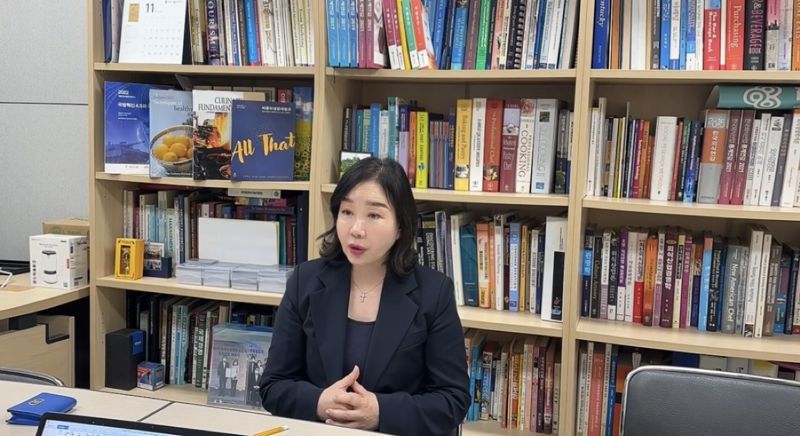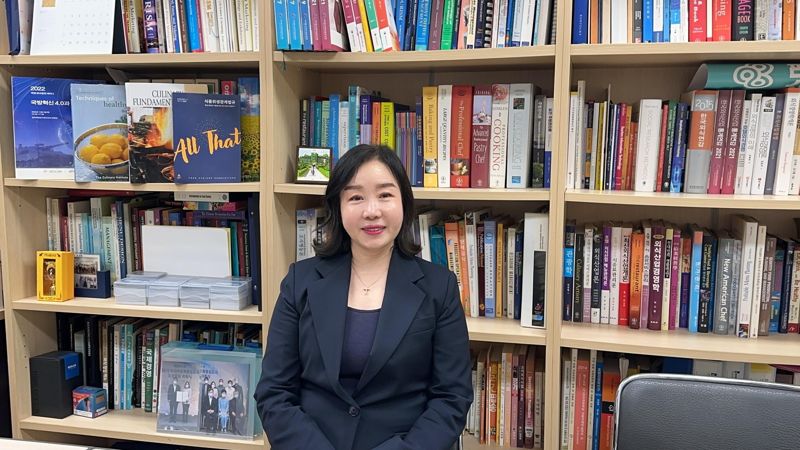Ham Sunok, Chair of the K-Food Council: "Not the Result of the Korean Wave, but the Beginning of a National Strategy" [Exclusive Interview]
- Input
- 2025-11-01 10:00:05
- Updated
- 2025-11-01 10:00:05

[Financial News]"We are no longer building just meals, but building industries."In an exclusive interview at Yonsei University's Sinchon Campus on the 1st, Ham Sunok, professor of Food and Nutrition and chair of the K-Food Council, emphasized that the rise of Korean cuisine on global tables is not a passing trend, but a turning point for the national brand industry.
The K-Food Council, which she is spearheading, is the first practical stage of this transformation. Officially launching on the 2nd of next month at the main conference hall of the National Assembly Members' Office Building in Yeouido, the Council will serve as a public-private-academic-industry collaboration platform with participation from government, industry, academia, and public institutions. Its goal is to foster the structural growth of K-Food and strengthen its export competitiveness.
K-Food: The Beginning of a National Strategy, Not Just a Byproduct of the Korean Wave
Having spent over 20 years researching the food service industry in the United States and gaining firsthand knowledge of the global dining market, Professor Ham views K-Food not as a byproduct of the Korean Wave, but as a 'national strategic asset.'
While K-Food is currently in the spotlight thanks to K-pop and dramas, Professor Ham believes its essence goes far beyond that. She explained, "Just as pasta in Italy or sushi in Japan are more than mere menu items, Korean food should also be established as a 'way of life' that embodies Korea's identity and values."
She further emphasized, "For K-Food to achieve sustainability, it must develop as a strategic industry connecting culture, economy, and diplomacy. We shouldn't view the Korean Wave merely as a consumer product; the industry's systems, technologies, and policies must move forward together."

"Lowering Industry Barriers Is the Key to Real Competitiveness"
The K-Food Council is not simply an academic gathering. It positions itself as a policy-driven platform designed to address real-world issues in the industry.
"Large corporations can resolve issues on their own, but small and medium-sized enterprises struggle even to access information. To export to the United States, they must meet all hygiene and facility certifications, but many small businesses, such as gimbap shops, don't even know where to begin."
Although each government ministry has its own certification standards, there is a lack of practical guidelines that companies can utilize. Professor Ham stated, "The Council will systematize these procedures and provide processes that can be directly applied in the field."
As president of The Korean Society of Foodservice, she defines academia's role as a bridge between industry and policy. To realize this, Professor Ham has worked on government policy projects and corporate initiatives with the Ministry of Agriculture, Food and Rural Affairs (MAFRA), the Ministry of Food and Drug Safety, and the Ministry of National Defense (MND), conducting in-depth research on the structural and policy gaps in the industry. She has also visited numerous front-line military units to gain a clear understanding of foodservice operations.
Stressing that professors must understand the field to design effective policies, she said, "If industry and government operate separately, policies become redundant and the industry becomes fragmented. Academia should research industry issues, and the government should translate these into policy. The Council will serve as the intermediary in this process."
Going forward, the K-Food Council aims to promote 'industry-centered policy.' It also plans to build a one-stop export platform by integrating export certification, workforce development, global networking, and new business development.
She stressed, "K-Food policies, which have been pursued separately by each ministry, must now be unified under a comprehensive, cross-ministerial strategy. The industry should take center stage, with the government supporting it." She added, "The Council will serve as a channel to gather industry voices and connect them to policy."

Patriotism Engraved in Her Heart: With Justice, Fairness, and Innovation
Professor Ham, who believes that establishing a robust food industry is an act of patriotism, is clear in her values as both a researcher and an educator.
"I often tell my students, 'Don't miss out on the big cake while searching for a small one.' Dream big. The world is vast, and the future of K-Food is ours to shape."
Even at the end of the interview, she repeatedly emphasized the word 'industry.' For her, K-Food is not just food, but a future national strategy and a cultural asset.
"It's time to stop viewing the Korean Wave solely as a consumer product. True competitiveness emerges when industry systems, technology, and policy move forward together. K-Food will be at the center of this transformation."
The K-Food Council, for which she has outlined a blueprint, stands at the heart of the long journey from academia to industry, and from industry to national strategy.
rsunjun@fnnews.com Yoo Sun-joon Reporter